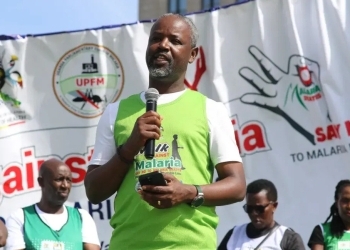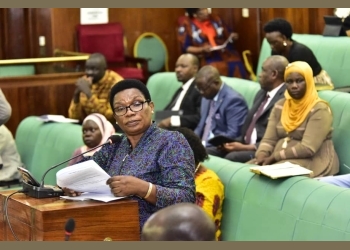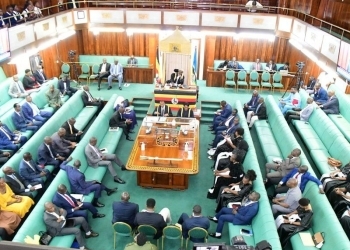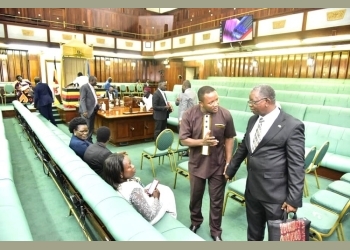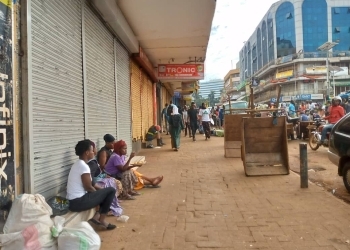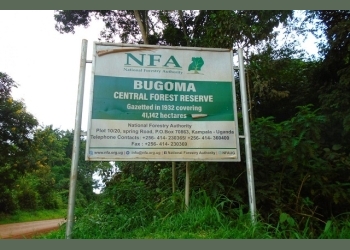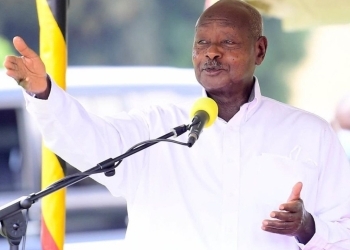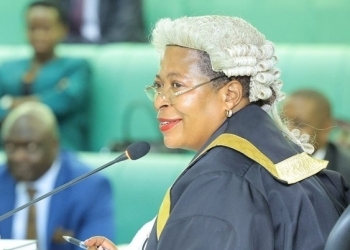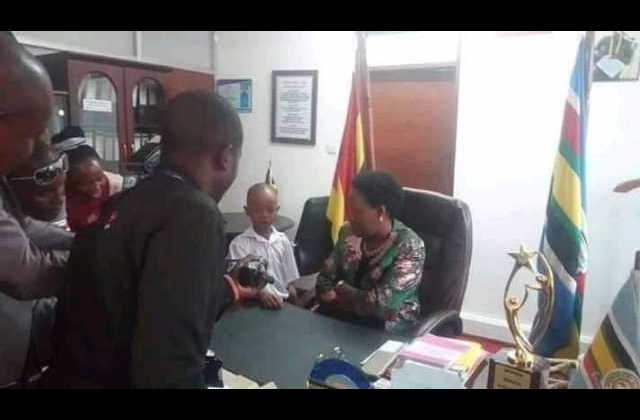
Finally, I thank the NRM Government for the strategic guidance and all the MDAs, Development Partners, the Social Development Sector Working Group and other stakeholders for their enduring support to the Sector.
The Mandate of the Social Development Sector is “to empower communities to harness their potential through skills development, labour productivity and cultural growth for sustainable and gender responsive development”.
⦁ To achieve this, the sector promotes community level action to reduce poverty and facilitates necessary conducive environment for other sectors to effectively deliver services to all sections of the population.
⦁ The key role of the sector is to promote the rights of the vulnerable and marginalized groups and enable them appreciate, demand and uptake social services.
⦁ Therefore, the sector plays a fundamental role in creating demand for social services and laying a foundation for other sectors to improve their delivery to the manifesto outcomes.
⦁ The Mandate of the Social Development Sector is “to empower communities to harness their potential through skills development, labour productivity and cultural growth for sustainable and gender responsive development”.
⦁ To achieve this, the sector promotes community level action to reduce poverty and facilitates necessary conducive environment for other sectors to effectively deliver services to all sections of the population.
⦁ The key role of the sector is to promote the rights of the vulnerable and marginalized groups and enable them appreciate, demand and uptake social services.
⦁ Therefore, the sector plays a fundamental role in creating demand for social services and laying a foundation for other sectors to improve their delivery to the manifesto outcomes.
⦁ Key Areas of Contribution by the Sector to the Manifesto
In line with the NRM Manifesto theme of “Taking Uganda to Modernity through Job creation and inclusive Development” 2016-2021, the Social Development Sector’s main areas of contribution to the manifesto implementation include the following:
⦁ Addressing empowerment of special interest groups (Women, Youth and the Elderly) as well as gender inequalities;
⦁ Increasing labour productivity and employment;
⦁ Promoting and protecting the rights of the vulnerable and marginalized groups;
⦁ Strengthening Social Risk Management and Gender Based Violence Response and Management;
⦁ Empowerment of People with Disabilities (PWDs);
⦁ Empowerment of the older persons;
⦁ Key Areas of Contribution by the Sector to the Manifesto cont…
vii Provision of Affirmative action for the Urban Poor;
viii Rehabilitating of War-Ravaged and impacted Areas;
ix Promoting Good Governance; and
x Reducing corruption.
Come up with a Uganda Women Entrepreneurship Programme (UWEP) aimed at promoting a conducive business environment and building institutional and human capacities that will encourage and support the entrepreneurial initiatives of rural women
Achieved: 94%
⦁ Established the Uganda Women Entrepreneurship Programme (UWEP). The Programme provides revolving funds and has improved access to affordable capital for the vulnerable women.
⦁ Disbursed Shs106,372,997,806 to women groups for 10,922 projects, benefiting 135,873 women.
⦁ Recovered Shs14.629Billion of the revolving funds, reflecting 93.0% of the funds due.
⦁ 368 women groups have repaid 100% of the loan.
PLEDGE: Harmonize domestic policies with regional and international processes that seek to enhance the status of women
Achieved: 90%
PROGRESS:
⦁ Revised the Uganda Gender Policy, 2007 to align it with international, national and regional frameworks / instruments; in particular to the Sustainable Development Goals and the East African Community Gender Policy, and National Development Plan (NDP) II;
⦁ Led the Formulation of the East African Community Gender Policy;
⦁ Launched the National Policy on Elimination of Gender Based Violence in Uganda, 2016;
⦁ Developed and implemented the National Action Plan on the Elimination of Gender Based Violence (2016-2021); Developed the National Action Plan on Women Peace and Security (2020-2025); and Conducted National Women Council Elections across the country. A total of 354,600 leaders were elected.
PLEDGE:
Continue to protect the rights of women and girls through promotion of maternal health, ending child marriages, curbing teenage pregnancy, tackling stagnating prevalence of HIV/AIDS and implementing a National Policy and Action Plan to eliminate Gender-Based Violence and Female Genital Mutilation
Achieved: 90%
PROGRESS:
⦁ Launched the National Action Plan for Women, Girls Gender Equality and HIV and AIDS 2016/17- 2020/21;
⦁ The MGLSD is supporting the running of the GBV Shelters in the 13 districts of Gulu, Lira, Masaka, Mbarara, Kumi, Katakwi, Amuru, Pallisa, Nebbi, Mubende, Kween, Moroto and Kampala;
⦁ Disseminated the Male Engagement Strategy and the GBV Action Plan to LGs and other Stakeholders;
⦁ Supported the implementation of activities on the reduction of FGM in Sebei and Karamoja sub regions;
⦁ Implementing the National Strategy to End Child Marriage on Teenage Pregnancy, 2015-2020
⦁ Implementing initiatives on elimination of violence against women and girls with support from EU-UN Spotlight Programme. The key activity is community sensitisation;
⦁ The Programme covers the following 7 districts:
⦁ Amudat: All Sub Counties;
⦁ Arua: Imvepi and Rhino refugee settlements and host communities;
⦁ Kampala: Select communities;
⦁ Kasese: All Sub Counties;
⦁ Kitgum: All Sub Counties;
⦁ Kyegegwa: Kyaka II settlement and host communities; and
⦁ Tororo: All Sub Counties.
PLEDGE:
Ensure the provision for gender and equity budget compliance in the Public Finance Management Act, 2014 is operationalized by Government Agencies and Institutions to integrate a Gender perspective in their plans and budgets so as to ensure equal opportunities and benefit for women, men, boys and girls
Achieved: 87%
PROGRESS:
⦁ The Social Development Sector has maintained high levels of compliance with Gender and Equity budgeting based on assessment of the Equal Opportunities Commission. The scores have been as follows;
⦁ FY 2016/17 scoring 98%,
⦁ FY 2017/18 scoring 91%,
⦁ FY 2018/19 scoring 88%,
⦁ FY 2019/20 scoring 93%, and
⦁ FY2020/21scoring 95.5%
⦁ Formed a resource pool of 100 trainers from selected MDAs. They have been trained as National Trainers and Assessors on Gender and Equity Budgeting across MDAs and LGs.
⦁ Trained 44 National Gender and Equity Assessors, who are responsible for Conducting various Assessments;
⦁ Established an Online Gender and Equity Information Management Systems for enhancing efficiency in the Assessments, Training, Tracking and Reporting;
⦁ Oriented 15 committees of Parliament in gender and equity concepts and analysis skills; and
⦁ Developed tools and guidelines including Sector Specific Gender and Equity Compacts for all Sectors, the National Compendium on gender and equity issues, Gender and Equity Compact for Local governments, National Gender and Equity Statistics Strategy; and the Gender and Equity Guide for the Parliament, among others.
PLEDGE:
Strengthen and invest in child protection systems in the country at all levels. Formulate and implement relevant legal policy frameworks that respond to the needs of children, improvement of capacities and professionalization of probation and social welfare services.
Achieved: 88%
PROGRESS:
⦁ Formulated the National Integrated Early Childhood Development Policy and its Action Plan.
⦁ Launched the report on Violence Against Children
⦁ Trained 80 Probation Officers and 500 CDOs in alternative care, coordination networks and collaboration with other stakeholders.
PLEDGE:
Strengthen and invest in child protection systems in the country at all levels.
Formulate and implement relevant legal policy frameworks that respond to the needs of children, improvement of capacities and professionalization of probation and social welfare services.
Achieved: 88%
PROGRESS:
⦁ Formulated the National Integrated Early Childhood Development Policy and its Action Plan.
⦁ Launched the report on Violence Against Children
⦁ Trained 80 Probation Officers and 500 CDOs in alternative care, coordination networks and collaboration with other stakeholders.
⦁ The Ministry is operating 8 Regional Remand Homes, 1 Reception Centre and 1 National Rehabilitation Centre for juveniles. These are holding over 700 juveniles on average at any one moment;
⦁ 800 Probation & Welfare Officers trained in para legal services; and
⦁ Over 15,000 Para Social Workers trained to promote Community Based Child Care and Protection.
PLEDGE:
Enhance prevention and referral of child abuse cases through mechanisms like child helpline, justice system among others which will be strengthened and invested in.
Achieved: 87%
PROGRESS
⦁ Established the Uganda Child Help Line( Sauti 116) and 61 District Action Centres. The line has received cases as follows:

Table 2
PLEDGE:
Establish a family inspection system to ensure that children are not harmed or abused
Achieved: 85%
PROGRESS:
⦁ Established alternative care framework to address concerns of children not living with their biological parents (temporary or permanent)
⦁ Developed and launched the Children Diversion Guidelines for Police Officers2019.
⦁ Launched the Parenting Guidelines May, 2018
PLEDGE:
Supporting Early Childhood Development (ECD) Programmes.
Communities sensitised about other aspects of child protection that may threaten their proper growth into desirable human capital or decent and valuable human beings
Achieved: 89%
PROGRESS:
⦁ Established coordination structures at national and district levels to ensure issues of children between 0-8 years are mainstreamed in sectoral plans and budgets;
⦁ Trained 4,000 Local Government staff on Integrated Early Childhood Development (IECD) Programming; and
⦁ Trained staff of 30 Civil Society Organisations on Integrated Early Childhood Development Programming.
PLEDGE:
Advocate for investment in children at all levels to improve their well-being. This includes care and protection of children in private and public institutions, ensuring abandoned children are internally fostered and adopted so as to minimise international adoption and institutionalisation of children
Achieved: 90%
PROGRESS:
⦁ Developed a multi-sector strategy to handle the street children phenomenon. The street children rehabilitated have been as follows:
⦁ 1,000 in FY2019/20;
⦁ 796 in FY2018/19;
⦁ 2223 in FY2017/18;
⦁ 3456 in FY2016/17;
⦁ 3445 in FY2015/16;
⦁ Formed a National Multi-Sectoral task force on street children. Membership comprised of Ministry of Gender, Labour and Social Development, Office of the Prime Minister/ Ministry for Karamoja Affairs, Ministry of Internal Affairs, Ministry of Local Government, Ministry of Justice and Constitutional Affairs, Ministry of Finance, Planning and Economic Development, Uganda Police Force, Civil Society Organizations, Kampala Capital City Authority and selected district local governments e.g. Napak
PLEDGE: Promote and increase access to quality and affordable basic services to children especially the vulnerable
Achieved: 70%
PROGRESS:
⦁ Developed National Action Plan on Alternative Care for Children 2016/17-2020/21.
⦁ Trained 160 Probation Officers, 160 DCDOs/PCDO and 800 CDOs/ACDOs in Child care, legal instruments and alternative care in all the LGs.
- 2016 PWOs 40, DCDOs/PCDOs 40, CDOs/ACDOs 200
- 2017 PWOs 40, DCDOs/PCDOs 40, CDOs/ACDOs 200
- 2018 PWOs 40, DCDOs/PCDOs 40, CDOs/ACDOs 200
- 2019 PWOs 40, DCDOs/PCDOS 40, CDOs/ACDOs, 200
⦁ 2500 children have accessed legal justice
⦁ MGLSD is paying School fees for 41 Children (24 female and 17 male) in Naguru Reception Centre (in Primary, Secondary , Tertiary / University levels)
PLEDGE:
Progressively build juvenile homes in all regions for corrective actions for children who break the law
Achieved: 90%
PROGRESS:
⦁ Built 2 new Regional Remand Homes:
⦁ Arua Remand Home(new) with capacity of 80 children, and
⦁ Kabale Remand Home(new) with capacity of 80 children.
⦁ Renovated existing juvenile homes
⦁ Fort-Portal Remand Home
⦁ Mbale Remand Home
⦁ Naguru Remand Home
⦁ Kampiringisa National Rehabilitation Centre;
⦁ Naguru Reception Centre
⦁ A new Regional Remand Home in Moroto for Karamoja Region is under construction with capacity of 80 children;
⦁ Construction of a new Regional Remand Home with capacity of 80 children in Masindi will commence in FY 2020/2021; and
⦁ The Ministry is in the final stages of fully taking over Gulu Remand Home to serve the Acholi and Lango sub-regions.
PLEDGE:
Prrogressively build juvenile homes in all regions for corrective actions for children who break the law
Achieved: 90%
PROGRESS:
⦁ Built 2 new Regional Remand Homes:
⦁ Arua Remand Home(new) with capacity of 80 children, and
⦁ Kabale Remand Home(new) with capacity of 80 children.
⦁ Renovated existing juvenile homes
⦁ Fort-Portal Remand Home
⦁ Mbale Remand Home
⦁ Naguru Remand Home
⦁ Kampiringisa National Rehabilitation Centre;
⦁ Naguru Reception Centre
⦁ A new Regional Remand Home in Moroto for Karamoja Region is under construction with capacity of 80 children;
⦁ Construction of a new Regional Remand Home with capacity of 80 children in Masindi will commence in FY 2020/2021; and
⦁ The Ministry is in the final stages of fully taking over Gulu Remand Home to serve the Acholi and Lango sub-regions.
⦁ Kampiringisa National Rehabilitation Centre offers skills training in mechanics, confectioneries, welding, tailoring and farming to juveniles undergoing rehabilitation.
⦁ Equipment provided to Juvenile Homes
⦁ Arua Remand Home(new) 80 double decker beds and beddings and 1 Computer Set;
⦁ Kabale Remand Home(new) 80 double decker beds and beddings and 1 Computer Set;
⦁ Gulu Remand Home, 1 Computer Set;
⦁ Fort-Portal Remand Home, 1 Computer Set, 60 Beds and Beddings;
⦁ Mbale Remand Home, 1Computer Set, 20 double decker beds and beddings; and
⦁ Naguru Remand Home, 5 Computer Sets, 50 double decker beds and beddings.
⦁ Ministry has licensed 140 children homes managed by NGOs and FBOs (holding approximately 6,500 children) across the country.
PLEDGE:
Improving the capacities and professionalism of probation and social welfare services offered in the country.
Achieved: 75%
PROGRESS:
⦁ Carried out a Study on probation and social welfare function to identify gaps so as to strengthen probation services in Uganda and recommended a new structure which has been approved;
⦁ Distributed 435 Tablets to CDOs and Probation and Welfare Officers country wide. The tablets are loaded with legal framework and current information on children;
⦁ Established and operationalized 61 District Action Centres to respond on cases of violence against children reported through Uganda Child Helpline116;
⦁ Recruited 68 Social Welfare Officers in 9 districts FY 2019/2020to beef up CDOs ( Arua,Kasese, Adjumani, Kitgum, Kaabong,Kamuli, Tororo, Amudat and Iganga)
PLEDGE:
Promoting internal fostering and adoption of children so as to minimise international adoption of children
Achieved: 80%
PROGRESS:
⦁ Established national alternative care panel to screen prospective parents eligible for fostering and adoption cases; and
⦁ Disseminated the Children (Amended) Act 2016; Children Approved Homes Rules and the Alternative Care Framework in all LGs.
PLEDGE:
Institutionalize community-based training and re-training of concerned persons on pre-school preparatory nurturing for all children in the country as part of the cognitive development programme
Achieve: 80%
PROGRESS:
⦁ Developed and launched the National Integrated Early Childhood Development (NIECD) Policy and Action Plan 2016; and
⦁ Established NIECD Coordination structures at the National and Local Governments levels.
PLEDGE:
Strengthen and fully implement countrywide, the existing youth programmes such as the Youth Livelihood Fund and Skilling Uganda programmes. The Youth Livelihood Programme will benefit at least 280,000 youth.
PROGRESS:
⦁ Financed a total of 20,159 youth projects worth Shs160.238Billion benefiting 241,799 youth of whom 46% are female;
⦁ The projects funded in the different years are:
⦁ 4,210 youth projects benefiting 46,484 youth in 2019 (44%)
⦁ 4,455 youth projects benefiting 51,192 youth in 2018 (55%)
⦁ 3,284 youth projects benefiting 38,488 youth in 2017 (47%)
⦁ 2,705 youth projects benefiting 33,789 youth in 2016 (39%)
⦁ This has created about 200,000 direct jobs and over 500,000 indirect jobs through the multiplier effects at household and community levels;
⦁ An independent Impact Evaluation of the Programme by consultants from the University of California and Makerere University conducted in 2018/2019 revealed that the Programme had made a 4% contribution to job creation in Uganda;
⦁ The projects funded under the Youth Livelihood Programme are majorly in :
⦁ Agricultural Sector (32.55%),
⦁ Trade (28.80%), Service (22.68%),
⦁ Industry (5.48%),
⦁ Vocational Skills (4.92%),
⦁ Agro Industry (value addition) (3.69%),
⦁ Agro Forestry (0.94%), ICT (0.51%),
⦁ Creative Industry (0.42%), and
⦁ Health Care (0.02%).
⦁ Under the Youth Venture Capital Fund,
⦁ Shs138Billion has been accessed by youth through Centenary Bank since FY2011/12;
⦁ The funds have supported 32,748 youth enterprises (36.5% female, 63.5% male); and
⦁ The Ministry has reduced the interest rate for the Youth Venture Capital Fund from 15% (fixed rate) to 11% (charged on declining balance basis).
⦁ Established the Uganda Green Incubation Centre- Songhai Model at Kampiringisa, a skills development centre on integrated production system based on organic farming; and
⦁ 222 youth have been trained/mentored in the Songhai model green jobs creation.
PLEDGE:
Consolidating youth participation in decision making and governance at all levels
Achieved: 95%
PROGRESS:
⦁ Developed and implemented Youth Participation Strategy;
⦁ Participation of youth leaders integrated at all stages of Programme implementation (National Youth Council, District/Municipality Youth Councils and Sub-county Youth Councils); and
⦁ Trained 16,526 youth in Non-formal vocational, entrepreneurial and life skills through two regional youth skills centres of Ntawo in Mukono and Kobulin in Napak – 55% female youth and 45% male youth and YLP. The major skills areas were: Tailoring and design, Carpentry and joinery, metal fabrication, motor mechanics, leather works (shoe making), Liquid soap making, Bakery and hair dressing (Cosmetology).
PLEDGE:
Support communities in the elimination of substance abuse at the household level. The initiative is driven by the need to address the plight of the youth and other vulnerable groups in dealing with drugs, alcohol and substance abuse in formal and informal institutional set ups
Achieved: 67%
PROGRESS:
⦁ Developed a Communication Strategy on Promoting Norms, Values and Positive Mindset among Young People.
PLEDGE:
Enhance implementation of the law on access to buildings for PWDs
Achieve: 75%
PROGRESS:
⦁ The Persons with Disabilities Act, 2020 has been assented to by H.E. the President and dissemination is ongoing. Section 10 of the law promotes the Principle of reasonable accommodation for PWDs in terms of physical access to buildings;
⦁ Trained stakeholders (EOC, KCCA, Wakiso and Judiciary) on accessibility standards of facilities for PWDs; and
Access to buildings by PWDs is now part of the checklist for inspection of workplaces and approval of architectural plans by the Occupational Safety and Health Department of the MGLSD
PLEDGE:
Enhance implementation of the law on access to buildings for PWDs
Achieve: 75%
PROGRESS:
⦁ The Persons with Disabilities Act, 2020 has been assented to by H.E. the President and dissemination is ongoing. Section 10 of the law promotes the Principle of reasonable accommodation for PWDs in terms of physical access to buildings;
⦁ Trained stakeholders (EOC, KCCA, Wakiso and Judiciary) on accessibility standards of facilities for PWDs; and Access to buildings by PWDs is now part of the checklist for inspection of workplaces and approval of architectural plans by the Occupational Safety and Health Department of the MGLSD
PLEDGE:
Fully operationalize the National Plan of Action for Older Persons. Also progressively roll out SAGE to cover more districts
Achieved: 75%
PROGRESS:
⦁ National Council for Older Persons structures have been established from the village to national levels;
⦁ Rolled out implementation of the SAGE Programme in all districts targeting 358, 420 older persons of which 143,368 are Male and 215,952 Female; and
⦁ The national roll out was launched by H.E the President on the 8th March, 2020 during the celebration of the International Women’s Day in Mbale.
PLEDGE:
Provide support towards common user facilities and tool kits to artisans, including Jua Kali, at affordable rates
Achieved: 80%
PROGRESS:
Jua-Kalis needs assessment and Identification survey has been undertaken in all regions of the country;
⦁ 900 start-up business tool kits for Jua-Kalis procured and distribution to 274 Jua-kalis youth and women groups; and
⦁ 7 groups supported with grants (10m/= each group) for innovation in Green Jobs.
PLEDGE:
Implement skilling programmes to enhance capacity of school leavers for self-employment and employability
Set up internship programme for youth at universities and tertiary institutions to gain experience, which is critical when seeking formal employment
Achieved: 80%
PROGRESS:
The MGLSD finalized the Workplace Based Learning Policy which takes into account; (a) Apprenticeship; and (b) Graduate Volunteer Scheme;
⦁ Developed a National Apprenticeship Framework; and
⦁ 206 graduate volunteers have been placed in various workplaces: (Government – 70, Private companies – 48, Civil Society Organizations – 78 & UN Agencies - 10 ). This is being done with support from UNDP.
PLEDGE:
Review the minimum wage to match the cost of living and growth achievements in the economy
Achieved: 60%
PROGRESS:
⦁ The Minimum Wages Board has been set up. The Board has made recommendations for fixing the minimum wage in Uganda;
⦁ Approval of the report was deferred by Cabinet pending incorporation of sector specific minimum wages and its effects on job creation; and
⦁ Review of the report is ongoing in consultation with Uganda Bureau of Statistics taking into account the National Household Survey Data.
PLEDGE:
Continue to protect children from all forms of child labour, including combating all forms of human trafficking
Achieved: 85%
⦁ PROGRESS:
Mapped Child Labour Activities to identify the areas and activities where child labour is most prominent;
⦁ Child labour Inspections are being carried out across the country. The hotspot districts covered so far include Mubende, Busia and Abim as well as 12 mines in Namayingo, Moroto and Bugiri;
⦁ Developed and submitted the Principles for review of the Employment Act 2006 (Child labour inclusive) to Cabinet;
⦁ Developed the National Action Plan on elimination of all forms of Child Labour 2017/2018-2021/2022; and
⦁ MGLSD continues to work with the relevant MDAs in the fight against trafficking in person. An inter Ministerial Technical Committee (comprised of MGLSD, MIA, MoFA, ISO, ESO, CMI, CID, MOJCA and Interpol), has been formed to handle issues of Human trafficking in relation to Externalization of Labour.
PLEDGE:
Strengthen the framework for labor unions and the workers to co-operate as partners with Government and employers for effective dialogue
Achieved: 90%
⦁ PROGRESS:
⦁ National Tri-Partite Charter on labour relations has been signed by the Tri-Partite ( Government , Workers and Employers). This promotes social dialogue which has continued to improve Uganda’s performance, rating on labour issues internationally.
⦁ For instance, Uganda is a Board Member of ILO International Training Centre –Turin Italy, as well as the Spokesperson for Africa Region on the ILO Committee on Ending Violence and Harassment in the world of work.
PLEDGE:
Continue to pursue the following labour tenets: security of tenure at workplaces, safety and health issues in workplaces, expansion of social protection coverage for workers and their families, and working towards social dialogue between employees and employers
Achieve: 90%
PROGRESS:
⦁ 391 Government workers were paid workers compensation worth Shs2.608Billion over the reporting period;
⦁ The Labour Disputes (Arbitration and Settlement) Amendment Bill 2018 has been developed. It is in Parliament for discussion and approval;
⦁ Regulations on Election of Workers' Representatives to District Councils have been developed and gazzeted;
⦁ Developed Guidelines for Election of Workers' Representative in Parliament;
⦁ Inspected 2,970 workplaces country wide for compliance with Safety and Health Standards as well as Conditions and Terms of Work.
⦁ Trained 133 Labour Inspectors on OSH Inspection and social protection;
⦁ Developed the Principles for Amendment of the Workers Compensation Act 2000;
⦁ The National Social Security Fund (Amendment) Bill 2019 is before Parliament for discussion and approval. One of the objectives of the amendment is to expand social security coverage;
⦁ 1,650 statutory equipment examined and certified;
⦁ 140 architectural plans reviewed for compliance with safety and health standards;
⦁ 187 Environment Impact Assessment reports and 60 Environment Audit Reports have been reviewed; and
⦁ 1,200 workers have been sensitized on Occupational Safety and Health.
Industrial Court
⦁ Opened 9 sub registries in Mbarara, Soroti, Mbale, Mubende, Jinja, Gulu, Lira, Fortportal and Masaka. Filing of cases has been decentralized to the regional sub registries;.
⦁ Registered 2823 cases and completed 1191 cases (42%) over the reporting period as follows:

Table 3
⦁ The Industrial Court conducts regional circuits on quarterly basis in order to take services nearer to the communities; and
⦁ The Process of digitization of the operations of the Court has commenced this FY2019/20.
⦁ The Industrial Court conducts regional circuits on quarterly basis in order to take services nearer to the communities; and
⦁ The Process of digitization of the operations of the Court has commenced this FY2019/20.
PLEDGE:
Through embassies abroad, identify countries to export excess labour to in an organised manner so that Ugandans who get employment abroad are not exploited
Achieved: 85%
PROGRESS:
⦁ Signed three Bilateral Labour Agreements with Saudi Arabia , Heshmite Kingdom of Jordan and UAE;
⦁ Conducted monitoring visits to Saudi Arabia and Jordan;
⦁ Four (4) party contract adopted for domestic workers deployed in Saudi Arabia;
⦁ External Employment Management Information System has been established. Applications for external employment recruitment license, job vetting, and clearances are done online;
⦁ Licensed 200 external employment recruitment companies; and
⦁ Institutionalized mandatory pre-departure training for migrant workers.
PLEDGE: Continue identifying, verifying and returning assets that belong to cultural and tradition institutions that may be in Government possession
Achieved: 65%
PROGRESS:
⦁ Restitution is ongoing especially for Buganda Kingdom. About 380 land titles were returned by the Central Government.
PLEDGE: Enhance education and empowerment of families and households to achieve balanced diets
Achieved: 85%
PROGRESS:
⦁ The Nutrition Program has been scaled up with the aim of preventing severe macro and micro nutrition;
⦁ A total of 1890 CDOs from all LLGs have been trained in Nutrition programming and 21 key family care practices including nutrition, water and sanitation among others;
⦁ The CDOs in turn trained FAL instructors and Parish Development Committees;
⦁ Parish Development Committees and the FAL instructors organized Parish Level Community Meetings and guided them on the preparation of Action plans on Nutrition programming; and
⦁ Sensitization of the general public on the values of proper nutrition is ongoing.
PLEDGE:
Strengthen sensitisation and education of parents and caretakers on parenting, including proper nutrition, care, education and all other needs
Achieved: 65%
PROGRESS:
⦁ Developed and disseminated Parental Guidelines to over 500,000 parents and district local governments; 60 stakeholders (CSOs) and faith based organizations throughout the country;
⦁ Developed a National Parenting Agenda to provide evidence based information for Policy, Practice and Research (PPR). This is being done in collaboration with Child Health and Development Centre, Makerere University; and established National Parenting Reference Group.
PLEDGE:
Increase participation of the disadvantaged persons such as the PWDs and women in BTVET skills development programmes
Achieved: 85%
PROGRESS:
⦁ A total of 10,318 learners have participated in non –formal skills training under the different programmes in the Ministry. The key skills areas include soap making, tailoring, and metal fabrication among others
PLEDGE:
Accelerating the roll out of ICT-based community centres in the country
Achieved: 65%
PROGRESS:
⦁ Established 10 open access centres in public libraries in the LGs of Mbarara, Palisa, Hoima, Nakaseke , Mbale, Jinja, Moyo, Bugiri, Soroti and Paidha.
⦁ The 4G free WIFI internet project in Public Libraries is being implemented by National Libraries of Uganda (NLU) in collaboration with Airtel Uganda (a mobile telecommunication company). 23 Public/ Community libraries have been provided with free WiFi to enhance the internet Access speed in the libraries.
⦁ Local content for African Libraries Project launched. Ten (10) Public libraries (Hoima, Nakaseke, Kabarole, Masaka, NLU, Masindi, Zigoti-Mityana, Buhimba-Hoima, Kabwoya-Hoima, Kawempe Youth Centre) have benefited from the project by each getting 50 E-readers Digital Features Project in public/ community libraries.
PLEDGE:
Work harmoniously with cultural and traditional leaders for the development of their respective kingdoms and Uganda as a whole
Achieved: 70%
PROGRESS:
⦁ Supported 10 Traditional or Cultural Institutions including Acholi, Buganda, Lango, Rwenzururu, Inzu Yamaasaba, Tieng Adhola, Tooro, Busoga, Teso, Bunyoro and Lugbara to develop plans , resource mobilization strategy as well as Monitoring and evaluation plans for improved health and sustainable development of their subjects.
PLEDGE:
Support the continuity of the traditional leaders and institutions
Achieved: 80%
PROGRESS:
⦁ Strengthened monitoring and supervision engagement in 116 District Local Government for smooth collaboration with cultural institutions, as service delivery centres.
PLEDGE:
Institutionalize a national value system that will be based on positive aspects of culture and transformational requirements for modernity
Achieved: 80%
PROGRESS:
⦁ Developed a Communication Strategy and Implementation Plan on Promotion of Norms, Values and Positive Mind-sets among the young people in Uganda.
⦁ Launched and implemented the National Roadmap on the Year of the Family, 2017. The main focus was on identification of family specific investment and programmes; promotion of family life education and awareness creation on the value of parenting, marriage and ethical values.
PLEDGE:
Support the development and promotion of indigenous knowledge
Achieved: 50%
PROGRESS:
⦁ Conducted Community Inventory Mapping and documentation of Intangible Cultural heritage in four (4) communities of Alur in Nebbi, Ik in Kaabong, Basongora in Kasese and Acholi in Gulu;
⦁ Busoga Cultural Institution has been supported to make the Bigwala musical instruments; and
⦁ Conducted Community Inventory Mapping of Empaako in Tooro Kingdom.
PLEDGE:
Continue giving financial support to individual cultural leaders
Achieved: 90%
PROGRESS:
⦁ The Ministry disburses Shs60,000,000 annually to each of the 14 Cultural/ Traditional Leaders.
PLEDGE:
Continue to support initiatives aimed at making Uganda an international attraction in arts and entertainment
Achieved: 85%
PROGRESS:
⦁ The Ministry hosted the East African Arts and Culture Festival (JAMAFEST), 2017 in Kampala;
⦁ Participated in the East African Arts and Culture Festival (JAMAFEST), 2019 in Dar es Salaam, Tanzania;
⦁ The Ministry organizes annual commemoration of the World Culture Day on 21st March; and
⦁ The Ministry promotes cultural exchange programmes with 9 countries with which Uganda has bi-lateral agreements, including Korea, India, China and Turkey among others.
PLEDGE:
Support the emerging film industry by assisting actors to get training and equipment.
Achieved: 50%
PROGRESS:
⦁ The Ministry has reviewed the Uganda National Culture Policy. Film is now a standalone item from the broad area of creative industries in the old Policy, with specific interventions for its development;
⦁ The Principles for the Film Strengthening Bill have been developed .The strengthening of the Film Bill is one of the items on the Legislative agenda of Parliament for FY 2020/2021; and
The Ministry has signed MOUs with India, Turkey, Egypt, Iran, South Korea to strengthen films co-production.
PLEDGE:
Promote Uganda’s visual and performing arts
Achieved: 50%
PROGRESS:
⦁ Developed National Guidelines for the Provision of Psychosocial Support for Gender Based Violence Victims / Survivors;
⦁ Conducted ToT training on the National Guidelines for the provision of Psychosocial Support at the national level;
⦁ Trained District Community Development Officers, Community Development Officers, Probation and Welfare Officers, Civil Society Organizations on the use of the Guidelines;
⦁ 100 Community Development Officers (CDOs) trained to sensitize communities on the effects of Nodding disease syndrome related to social issues of discrimination, trauma, stigmatization, GBV and defilement;
⦁ Provided psychosocial support to 1,880 families of survivors of land slides in Bugishu sub-region and 930 families in Ruwenzori sub-region;
⦁ MGLSD is working with MoH to provide psychosocial support and protection services to COVID-19 patients, people in quarantine, survivors, responders and the general public.
OVERALL PERFORMANCE stands at 85.2%
The key challenges faced by the sector include:
⦁ Overwhelming demand for support by various vulnerable persons amidst limited resources;
⦁ Limited resources for effective implementation of the Community Development Function at the Local Government and City authorities;
⦁ Weak stakeholders coordination at the central and LGs levels;
⦁ Growing negative influence from uncensored media;
⦁ Inadequate family and community specific interventions to address parenting, work ethics and moral uprightness.
⦁ Inadequate enforcement of regulatory frameworks; and
⦁ Weak Information Management System to provide credible real time data on communities for decision making, policy making, programming, monitoring and evaluation, as well as reporting.
CHALLENGES:
The key challenges faced by the sector include:
⦁ Overwhelming demand for support by various vulnerable persons amidst limited resources;
⦁ Limited resources for effective implementation of the Community Development Function at the Local Government and City authorities;
⦁ Weak stakeholders coordination at the central and LGs levels;
⦁ Growing negative influence from uncensored media;
⦁ Inadequate family and community specific interventions to address parenting, work ethics and moral uprightness.
⦁ Inadequate enforcement of regulatory frameworks; and
⦁ Weak Information Management System to provide credible real time data on communities for decision making, policy making, programming, monitoring and evaluation, as well as reporting.
CONCLUSION:
⦁ Overall, the Sector performance against the targets stands at 85%. This is mainly attributed to the strong support from Government and Development Partners;
⦁ The Sector has built capacity and has put in place appropriate mechanisms for efficient and effective delivery of services to the communities; and
⦁ Adequate resources are required to build on the gains attained and ensure sustainability of the interventions in the next Manifesto period.
Finally, I thank the NRM Government for the strategic guidance and all the MDAs, Development Partners, the Social Development Sector Working Group and other stakeholders for their enduring support to the Sector.
